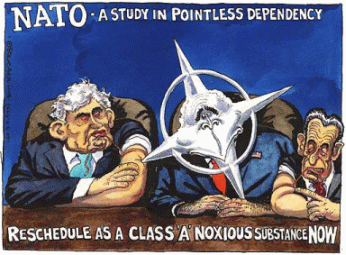
[Guardian Unlimited,
U.K.]
Kommersant, Russia
Who Wins and
Who Loses from NATO's Bucharest Summit?
"Russia’s voice is being heard
… and that can be considered a great achievement. … now
it's in the Russian interest to see that larger numbers of Ukrainians oppose
NATO accession."
By Evgeny Primakov*

Translated By Igor Medvedev
April 4, 2008
Kommersant - Russia - Original Article (Russian)
Who wins and who loses from
the summit in Bucharest? Those who ran headlong to NATO despite the likely
implications have unequivocally lost. And the implications are clear: a
splitting of Ukrainian society and a deterioration of Ukraine's relations with
Russia and Georgia. However, I would certainly not speak in terms of a Russian
win.
On the one hand, events show
that our voice is being heard. And that can be considered a great achievement
for Russia, which seeks to be an equal in the international arena. On the other
hand, we shouldn’t deceive ourselves: what happened in Bucharest did nothing to
negate Georgian and Ukrainian aspirations to join NATO.
And as paradoxical as it is,
I think that among the winners was the United States. President Bush stated
very firmly that he is fully behind the accession of Ukraine and Georgia, and
has thus dramatically improved America's position among the ruling elites of
these countries. But now he must meet with Vladimir Putin. I dare to hope that
Bush is interested in having a successful meeting. But the chances of success
would be much the lesser if at Bucharest, Ukraine and Georgia had been put on track
to join NATO.
It is known that on the
sidelines of the NATO Summit was a debate on the fate of the Friendship,
Cooperation and Partnership Treaty between Russia and Ukraine. Russia is
interested in normal, or perhaps even good relations with Ukraine. And it's in
the Russian interest to see larger numbers of Ukrainians oppose NATO accession.
According to various estimates, something like half the population is now
opposed. If Russia withdraws from the Treaty it will worsen relations with
Ukraine and increase the number of Ukrainians wanting to enter NATO.
There is another point. The
conclusion of the Treaty, and more importantly, its ratification in April 1999
were closely related to Ukraine’s ratification of the Agreement on the Black
Sea Fleet  .
Under the Agreement, we are guaranteed the right to keep the Black Sea Fleet in
Sevastopol
.
Under the Agreement, we are guaranteed the right to keep the Black Sea Fleet in
Sevastopol  for another 25 years.
for another 25 years.
I recall as prime minister, I
had come to a Federation Council session where we discussed the ratification of
an overall agreement with Ukraine. Our delegates were right not to favor
ratification without Ukraine’s agreement on the Black Sea Fleet.
Posted by WORLDMEETS.US
But Ukrainians didn't want to
agree without our ratification of the Friendship, Cooperation and Partnership
Treaty. Then I suggested a two-step method of breaking the impasse. First step - ratification. Second step -
an exchange of instruments of ratification, after which Ukraine’s Parliament
would pass a law ratifying the Black Sea Fleet Agreement. The impasse
was broken. Should we forget this bond that we forged? There are many other
ways to show discontent over Ukraine's current policies without breaking the
Friendship, Cooperation and Partnership Treaty.
Posted by WORLDMEETS.US
As for prospects of
cooperation’s between Russia and NATO, we now have stable relations with that
organization, which consists of the Russia-NATO Council. I think that these
relations of mutual advantage will continue, in light of our own sober approach
toward the North Atlantic Alliance.
*Evgeny
Primakov was Boris Yeltsin's Foreign Minister from
1996-1998, an Prime Minister from 1998-1999 
CLICK HERE FOR RUSSIAN
VERSION
[Posted by WORLDMEETS.US April 3,
7:13Pm]